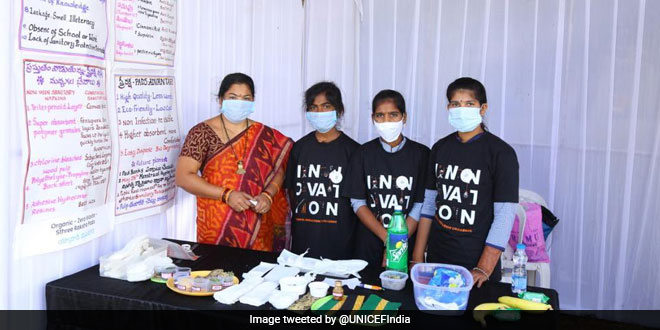Highlights
- The pads available in the market don't decompose easily: Student
- People should talk about menstruation and raise awareness: Student
- Proud of students for coming up with idea of Stree Raksha Pads: Teacher
Telangana: In an attempt to provide an organic solution to sanitary waste, the students of a government school in Yadadri Bh uvanagiri district of Telangana have come up with the idea of ‘zero waste’ sanitary napkins named ‘Stree Raksha Pads’. The students of Zilla Parishad High School (ZPHS) Mulkalapally have made these organic sanitary pads using water hyacinth, fenugreek, turmeric, neem and sabja seeds. “The pads available in the market don’t decompose easily. To solve this problem, we made this pad made of organic materials. To find a solution to the prevailing sanitary waste issue, we have come up with an idea and have created sanitary pads from organic materials. The sanitary pads that are currently being used by many are made from petroleum chemicals which have many side effects and take many years to decompose leading to many environmental issues,” Swathi, a student of ZPHS Mulkalapally told ANI.
Amazing innovations presented by young people in #Telangana in the grand finale of the #SchoolInnovationChallenge in Hyderabad today.
????4041 schools and 8750 students took part, with 25 finalists ???? pic.twitter.com/Z8e3z29BWn
— UNICEF India (@UNICEFIndia) January 4, 2021
Also Read: Telangana Government Forms Four Committees For COVID-19 Vaccination Mechanism
After researching that water hyacinth has a lot of ayurvedic essence in it and the way it has been used by many women by warping it in a cloth along with cow dung as sanitary pads during ancient times, we have decided to create more contemporary sanitary pads, she added.
Explaining the process of making ‘Stree Raksha Pads’, Swathi said,
After creating a paste of water hyacinth mixed along with neem leaves, fenugreek and turmeric, they are dried till it becomes a solid board and cut into the standard sanitary pads size and then fenugreek and sabja seeds are added over this board along with beeswax glue and are placed between to cotton strips and are sealed.
Anita, another student studying 10th class in ZPHS said,
It is necessary that people talk about the menstrual cycle and create awareness among people and themselves too. And to do our part in creating awareness and the use of organic sanitary pads during menstruation, we have come up with this idea of Organic sanitary pads. These pads not only help women during their menstruation but also is eco-friendly.
Kalyani, the teacher who guided the students in creating these pads said that she is proud of her students for coming up with the idea of ‘Stree Raksha Pads’.
The girls who live in village areas cannot afford the contemporary sanitary pads as they are costly and many still stick to the ancient methods. Moreover, the sanitary pads available in the market are made from petroleum chemicals and may have side effects like itching and sometimes lead to serious complications and they are not biodegradable either. So the students have come up with this idea to create an organic sanitary pad named ‘Stree Raksha Pads’. I am proud of them, she said.
(Except for the headline, this story has not been edited by NDTV staff and is published from a syndicated feed.)
NDTV – Dettol Banega Swasth India campaign is an extension of the five-year-old Banega Swachh India initiative helmed by Campaign Ambassador Amitabh Bachchan. It aims to spread awareness about critical health issues facing the country. In wake of the current COVID-19 pandemic, the need for WASH (Water, Sanitation and Hygiene) is reaffirmed as handwashing is one of the ways to prevent Coronavirus infection and other diseases. The campaign highlights the importance of nutrition and healthcare for women and children to prevent maternal and child mortality, fight malnutrition, stunting, wasting, anaemia and disease prevention through vaccines. Importance of programmes like Public Distribution System (PDS), Mid-day Meal Scheme, POSHAN Abhiyan and the role of Aganwadis and ASHA workers are also covered. Only a Swachh or clean India where toilets are used and open defecation free (ODF) status achieved as part of the Swachh Bharat Abhiyan launched by Prime Minister Narendra Modi in 2014, can eradicate diseases like diahorrea and become a Swasth or healthy India. The campaign will continue to cover issues like air pollution, waste management, plastic ban, manual scavenging and sanitation workers and menstrual hygiene.
[corona_data_new]



























